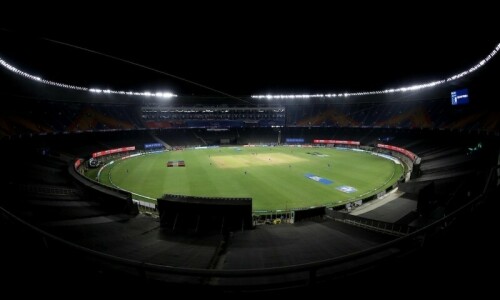A mix of Pakistan cricket’s cream and some familiar expats will be in action in the United States when the inaugural season of the Major League Cricket (MLC) — a long-awaited T20 tournament — kicks off on Friday (July 14).
Fast bowler Haris Rauf and all-rounders Shadab Khan and Imad Wasim are some of the big names from Pakistan who will participate in the first-of-its kind event being jointly hosted in Texas and North Carolina.
Haris and Shadab, the two centrally contracted players, will represent San Francisco Unicorns, while Imad will be playing for Seattle Orcas.
Los Angeles Knight Riders, MI New York, Texas Super Kings, and Washington Freedom are the four other teams participating in the league. The 19-day competition will go on from July 13 to July 30 at Grand Prairie Stadium and Church Street Park.

The announcements came in earlier this month as Pakistan Cricket Board (PCB) granted no-objection certificates (NOCs) to the players after getting approval from the team management, medical panel, and the selection committee.
There were reports suggesting that the PCB demanded $25,000 per player to grant the NOCs.
Several international players, who left Pakistan for greener pastures of the US, will also be seen in action, including Hammad Azam, Sami Aslam, Ehsan Adil, Saif Badar, Saad Ali, and Mukhtar Ahmed. They will be participating in MLC as local players.
Azam and Adil will be representing the New York franchise owned by the Mumbai Indians of the Indian Premier League. While they left the country almost two-and-a-half years ago, the duo officially announced their retirement from Pakistan cricket only last week, as per a press release from PCB on Sunday.
“If you’re a former professional in another country, like Pakistan or West Indies, you have to show an NOC and an intent of retirement and then you’re considered a local for domestic leagues here,” Zubin Sarkari, tournament director of Minor League Cricket, said.
Sarkari, who is also currently handling operations at MLC, said that any player who can provide proof of intention to live in the US by having spent ten out of 12 months of the year in the country, and carries an approved visa is considered a local player by the domestic leagues’ management.
Lack of opportunities, excessive competition at home and, in a few cases, disregard from the PCB had led some of these cricketers to move to the USA.
Aslam, who has represented Pakistan in 13 Test matches and four One-Day Internationals, was dropped from the national squad in 2017. After struggling to find his way back in the team despite performing well domestically, the left-hander decided to move to the US in 2020 to seek a fresh start to his professional career.
“Every player who is not playing in the Pakistan Super League (PSL) is willing to come here,” Aslam told Dawn.com.
“I know people who are currently leading teams in the Quaid-e-Azam Trophy [and they are] saying that if they get an offer to play in the US, they will come here without thinking twice.”
The 27-year-old rued that countries such as Australia, England and India reward players who play red-ball cricket, but Pakistan ignores its longer format players. “That’s the reason why Test cricket is going down in the country.” he said.
“Nobody wants to play the longer format and those who do, do it as an obligation. Players know that selectors don’t choose players who perform in the four-month long domestic season but the ones who perform in one season of the PSL.”
Co-founded by Indian businessmen Sameer Mehta and Vijay Srinivasan among others, MLC has six teams, of which four are owned by various franchises of the Indian Premier League (IPL).
Aslam, who was picked by the Texas Super Kings in the domestic players draft held earlier in March, said he “wasn’t expecting to be picked by an IPL franchise because there were rumors of Indian teams not selecting Pakistani players but that didn’t happen”.
He added that they (the Super Kings) might have considered him as a US local resident instead.
“I’m having a lot of fun. It’s a very professional setup. They (Chennai Super Kings) recently won the IPL and it is the same management for the Texas team so it is nice being a part of it.”
Brashna Kasi is a Fulbright scholar and journalism graduate from Syracuse University New York.












































Dear visitor, the comments section is undergoing an overhaul and will return soon.